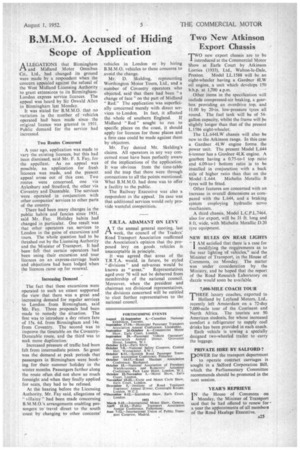B.M.M.O. Accused of Hiding Scope of Application
Page 27

If you've noticed an error in this article please click here to report it so we can fix it.
ALLEGATIONS that Birmingham and Midland Motor Omnibus Co., Ltd., had changed its ground were made by a respondent when the concern appealed against the refusal of the West Midland Licensing Authority to grant extensions to its BirminghamLondon express service licences. The appeal was heard by Sir Oswald Allen in Birmingham last Monday.
It was stated for B.M.M.O. that no variation in the number of vehicles operated had been made since the original licence was granted in 1931. Public demand for the service had increased.
Two Routes Concerned A year ago, application was made to vary the existing licences, but this had been dismissed, said Mr. F. S. Fay, for the appellant. As no appeal was possible, an application for fresh licences was made, and the present appeal arose out of this case. Two routes were concerned, one via Aylesbury and Stratford, the other via Coventry and Dunstable. The services were operated in conjunction with other companies' services to other parts of the country.
There had been many changes in the public habits and fancies since 1931, said Mr. Fay. Holiday habits had changed in particular. One result was that other operators ran, services to London in the guise of excursions and tours. The whole question had to be thrashed out by the Licensing Authority and the Minister of Transport. It had been fert that certain operators had been using their excursion and tour licences on an express-carriage basis and objections had been lodged when the licences came up for renewal.
Increasing Demand The fact that these excursions were operated to such an extent supported the view that there was a great and increasing demand for regular services to London from Birmingham, said Mr. Fay. Three proposals had been made to remedy the situation. The first was to introduce a day return fare of 15s. 6d. from Birmingham and 14s. from Coventry. The second was to improve the timetable on the CoventryDunstable route, and the third was to seek more duplication.
Increased pressure of traffic had been felt from intermediate points. So great was the demand at peak periods that passengers in Birmingham were booking for their summer holiday in the winter months. Passengers farther along the route often did not show so much foresight and when they finally applied for scats, they had to be refused.
At the hearing before the Licensing Authority. Mr. Fay said, allegations of " villainy" had been made concerning B.M.M.O.'s arrangements enabling passengers to travel direct to the south coast by changing to other concerns' vehicles in London or by hiring B.M.M.O, vehicles to these concerns to avoid the change.
Mr. D. SkeIding, representing Worthington Motor Tours, Ltd., and a number of Coventry operators who objected, said that there had been "a change of face" on the part of Midland "Red." The application was superficially concerned merely with direct services to London. In fact, it affected the whole of southern England. If Midland " Red " sought to run to specific places on the coast, it should apply for licences for those places and a firm case could be made against them by objectors.
Mr. Fay denied Mr. Skelding's claims. All operators in any way concerned must have been perfectly aware of the implications of the application. It was obvious from the time-table and the map that there were through connections to all'the points mentioned. What B.M.M.O. had done was to offer a facility to the public.
The Railway Executive was also a respondent in the appeal. Its case was that additional services would only provide wasteful competition.
T.R.T.A. ADAMANT ON LEVY
AT the annual general meeting, last week, the council of the Traders' Road Transport Association reaffirmed the Association's opinion that the proposed levy on goods vehicles is unacceptable in principle.
It was agreed that areas of the T.R.T.A. would, in future, be styled "divisions" and sub-areas would be known as "areas." Representatives aged over 70 will not be debarred from membership of the national council. Moreover, when the president and chairman are divisional representatives, the divisions concerned will be entitled to elect further representatives to the national council.




















































































